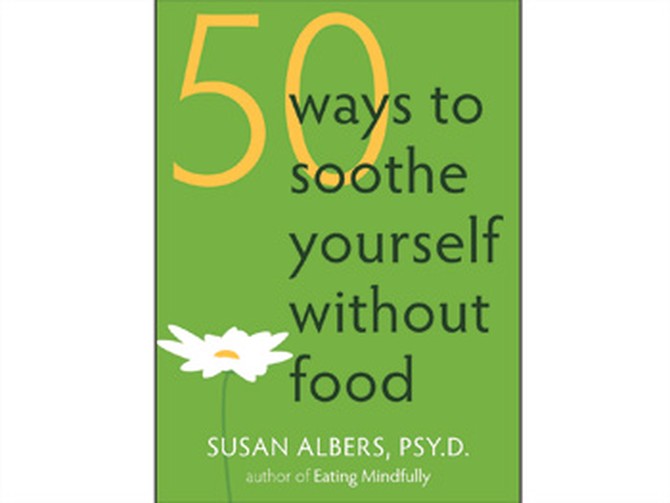Excerpt from 50 Ways to Soothe Yourself Without Food
It's time to stop going to the refrigerator or cupboards whenever you feel the urge to eat and start dealing with the problems you're trying to mask. Start with these 10 self-soothing techniques from psychologist Dr. Susan Albers' book 50 Ways to Soothe Yourself Without Food.
By Dr. Susan Albers

Count on Your Senses 5-4-3-2-1
When you have trouble clearing your mind of thoughts of food, try focusing on your senses.
- State one scent you can smell.
- Name two sounds you can hear.
- Describe three sensations your body is feeling, such as temperature, the texture of your sweater, your feet against the ground.
- Identify four colors that you see.
- To yourself, begin by naming five things you see in front of you.

Photo: © 2009 Jupiterimages Corporation
Finding Your Mindful Spirit
- Choose a short prayer or saying that holds special meaning for you. It could be a verse from the Bible or another spiritual book. Make sure you pick something very short, no longer than a few lines. Also, it must be something that you can repeat from memory. This phrase should connect with you or move you in a soulful way. Here are some suggestions: the twenty-third psalm, St. Francis's prayer, Buddha's discourse on good will, and the Serenity Prayer used by 12-step groups all across the world.
- Repeat the verse several times until your urge to eat lessens.
- Tranquility in front of me.
- Calmness beside me.
- Stillness around me.
- Compassion inside me.

Photo: © 2009 Jupiterimages Corporation
Medicinal Laughter
- Find the natural humor in whatever problem you're struggling with. To help, look to the future. What about this situation might cause you to laugh five years from today? Is there anything giggle worthy in it? For example, is there a Three Stooges moment? Try to imagine how your favorite comedian would take this situation and turn it into a humorous sketch.
- Do something funny. Leave a funny phone message for a friend. Make up a fictional name and use it all day. Wear a T-shirt or a hat that makes people laugh.
- Learn a one-line joke and tell it to everyone you meet in your day.
- Put a funny picture of yourself or an amusing picture from a magazine on your refrigerator door. You can even tape the picture onto a box of cookies in your cupboard so that when you start searching for food to snack on, you'll see it.

Photo: © 2009 Jupiterimages Corporation
Blank Mind
If you use food as a way to zone out, try out alternative ways to get a short mental break. Focus on repetitive, monotonous tasks. But first, get into the right frame of mind. Sit down. Give yourself permission to zone out. This part can be hard for busy moms, for type A personalities, or if you just have trouble sitting still. To help you work on emptying your mind, first imagine dumping out the contents of a wastepaper basket. Then imagine all the thoughts in your brain are pouring out of your head in the same way that you emptied the wastepaper basket. Now pick a mindless activity to do:
- Try flipping through a magazine. This is an activity that is barely active, mildly amusing, and doesn't require any mental effort at all. Reading a book takes too much mental energy. But just looking at pictures and scanning through photos is enough to decompress mindlessly and can also absorb nervous energy.
- Watch TV. Turning on the TV can often help you zone out. Sometimes, however, it just isn't active enough to keep you distracted. If watching TV doesn't do it for you, try flipping the channels. Make sure you aren't with others, as this will drive them a little crazy. This is similar to flipping through a magazine. The many images flashing before your eyes stimulate your mind and senses but don't require any active mental work.
- Do you want to zone out totally? Try closing your eyes. Focus on staring at the void and the blackness on the inside of your eyelids.
- Get back to basics. Think about some of the things you liked to do as a child. There is nothing more calming than nostalgic memories from childhood, like shaping Play-Doh or coloring mindlessly. Playing doesn't use much mental energy, and it's fun, stimulates your imagination, and boosts your energy.
- Try origami, the ancient Japanese art of folding paper. Go to origami.com for hundreds of examples. This is a very easy and mindless activity that will keep your hands busy and out of the cookie jar.

Photo: © 2009 Jupiterimages Corporation
Encouraging Words to End Stress Eating
Adopting a more positive outlook takes some effort and practice. Say the following statements out loud several times a day.
You can train your mind to bring affirming statements into your consciousness automatically. Choose one or more that resonate with you. Write the statements on cards and place them in easy-to-see locations, like your car's dashboard, a mirror, a door, or on your telephone.
When you say these affirmations, try to stay in the present. Instead of saying, "I will learn how to stop stress eating," say, "I am learning how to stop stress eating right now." Here are some examples you may find helpful:
You can train your mind to bring affirming statements into your consciousness automatically. Choose one or more that resonate with you. Write the statements on cards and place them in easy-to-see locations, like your car's dashboard, a mirror, a door, or on your telephone.
When you say these affirmations, try to stay in the present. Instead of saying, "I will learn how to stop stress eating," say, "I am learning how to stop stress eating right now." Here are some examples you may find helpful:
- I'm on the road to feeling calmer.
- Eating won't resolve this problem.
- I'm good at tackling a challenge head-on.
- I can do this. It just takes time.
- I can wait. My hunger will pass with a little patience.
- I can soothe myself. I don't need food to do that.
- I am going to feel less stressed any minute. I can hang in here.
- I enjoy being healthy.
- I feel good inside, and my outer body is just about to catch up with me.

Photo: © 2009 Jupiterimages Corporation
Letting Go of Zebra Thinking
Your task is to break out of old ways of black-and-white thinking. Here are some tips for actively choosing more soothing and realistic thoughts.
- Watch for trigger words. This includes absolute terms like "always," "never," "ever," "perfect," "disaster," and "impossible." If you hear yourself saying these words, try to counter them with a less extreme term, like "sometimes," "occasionally," "good enough" and so on. In the context of eating, typically these words form sentences like "I'm a complete failure," "I've totally ruined everything," and "I will never be able to stop stress eating." Instead, focus on a more realistic statement, such as "I am often able to soothe myself with activities other than eating."
- Set up realistic expectations. Feeling overwhelmed is often partly due to unrealistic goals that you can't possibly achieve. Emotional eaters are notorious for setting themselves up for failure. Statements like "I will eat only healthy foods tomorrow," or "I will never eat another donut" are zebra statements. You have to give yourself some leeway that you might slip up here and there.
- The two-minute rule. Emotional eaters often feel that they must do things perfectly or they give up. They think they'll do half an hour of exercise or none at all. Instead, whatever it is, commit to trying it out for just two minutes. For example, try just two minutes of a self-soothing technique. See what happens.

Slipping into Soothing Sensations
When you are looking for comfort, try calming one or more of your senses. You'll be amazed at how well this lessens the need to emotionally eat.
- Light therapy. Sunlight or bright full-spectrum light on your skin can significantly improve your mood. It's one of the main forms of treatment for seasonal affective disorder (SAD), which is a mild form of depression some people experience during the winter months when there is little sunlight (Golden et al. 2005). Sunlight helps reset your internal clock and increases your serotonin levels. When you feel you need comfort, sit by a window in indirect sunlight or go outdoors for thirty minutes—but don't forget to use sunscreen and sunglasses. If there's very little sunlight in the wintertime where you live or if you can't get outdoors, investigate buying a therapy light. These are bright lights you can use indoors that have the same healing effect as sunlight does.
- Sip hot or cold tea. If there's a pattern to your stress eating, you may want to schedule teatime for yourself at some point in the day when you might be prone to eat for emotional reasons. Tea is chemically complex. It has many different ingredients that affect neurotransmitters and other mood-regulating chemicals. Black tea has been shown to lower cortisol, a stress hormone (Steptoe et al. 2006). Chamomile is one type of herbal tea well-known for its soothing and calming properties.
- Apply a warm or cold washcloth. To calm your body, put a damp washcloth over your eyes, feet, or forehead. Choose a warm or cool cloth depending on what sounds the most soothing to you at the moment.

Photo: © 2009 Jupiterimages Corporation
Scrub Away Stress Eating
- Make an emergency cleaning box. It's frustrating to have to look for a sponge when you are trying to stop emotional eating.
- Organize a closet or a drawer in your desk. Pick one small project. If you choose too large an area, you might feel overwhelmed and therefore could feel worse.
- Determine what kind of cleaning you enjoy. Maybe you hate to wash windows but love to iron because you can stand in place. Perhaps you like to sweep quietly but dislike vacuuming because it is too loud. If you are a detail person, scrubbing tile may be the way to go, instead of tossing a big load of laundry into the washer.

Photo: iStockphoto
Be Your Own Masseuse
If physical discomfort is at the heart of your emotional eating, try some of these techniques. You may find that by addressing your physical discomfort, your desire to eat for emotional reasons has diminished.
- Hands. You will need some lotion for this technique. After you apply a dab of lotion to your hand, rub the palms of both hands together. Observe that some heat is created by the rubbing. Then clasp your hands together. Your fingers should be entwined. With your thumb, massage the area just below your other thumb in a circular motion. Continue massaging and move outward to the center of the palm. Rub each hand for two minutes.
Feet. This exercise can be done standing or sitting. To massage your feet, you will need a hard beach ball, golf ball, or tennis ball. If you are standing, be sure to hold the edge of a chair for support. Place one foot on the ball. Then roll your foot back and forth over the top of the ball. Next place the arch of your foot on top of the ball. Apply pressure gradually. Roll the ball around under your arch. Then roll the sole of your foot. Finally, roll under your toes and your heel. Follow the same procedure for your other foot. - Shoulders. You can also use a tennis ball for massaging your shoulders. Place the ball against a wall behind your shoulders. Roll the ball back and forth over and between your shoulder blades until you feel your shoulders relax. Do this for approximately three to five minutes.
- Eyes. Do you feel tension in your eyes? Briskly rub your palms together. As you rub, your palms will become warm. Then quickly, and gently but firmly, cover your eyes with your palms. Keep your eyes covered for half a minute. The warmth of your hands will transfer to your eyes.
- Ears. Using your thumbs and index fingers, begin by gently rubbing your outer ear rims. Then rub your earlobes. Continue doing this until your ears feel warmer.
- Face. For massaging your face, use the knuckles on your thumbs. Gently rub both thumbs' knuckles up and down alongside your nose, massaging up and down. If you want gentler pressure, do this with your fingertips. Then rub circles around your eyes with your fingertips. Make the circles large enough to completely reach around your eyes and above your eyebrows.
- Head. Rest both elbows on a table. Place your fingertips on your scalp underneath your hair. Massage your head with your thumbs and fingertips.
- Stomach. It's a natural response to rub your stomach when you overeat. Using clockwise, circular motions, rub your hand or palm over your abdomen approximately twenty times. Clockwise is the same direction that food travels in your intestines. This type of massage aids your digestive processes.

Photo: © 2009 Jupiterimages Corporation
Your Soothing Sponsor
- Choose your buddy wisely. Your buddy should be nonjudgmental and a good listener and shouldn't want to compete with you.
- Think of the person you choose as your soothing sponsor—someone who provides only support, not therapy or advice. Agree to call each other before engaging in emotional eating. As soon as you get the urge to emotionally eat, pick up the phone. Or if you are feeling vulnerable, call before you feel the urge.
- Chose a code word (a neutral word or phrase) to discreetly signal on the phone that you are in need of help.
- You also may want to come up with a motto or a slogan that exemplifies your goals. This can be a motivational quote or a team motto.
- Send your buddy encouraging words randomly by e-mail. Leave a thoughtful voice message. Send a poem by snail mail.
- Be a mindful listener. When you are with this person, let go of everything else on your mind. Try to avoid listening with just one ear or becoming distracted by your own thoughts. Really focus on everything your buddy is saying.
- Buy a copy of this book for your buddy and look through it together. Discuss which techniques might work well for the two of you to do together.
- Make each other accountable. Agree on the number of times you will check in with each other. Be proactive.
- Call instead of waiting for your buddy to call you.
- Meet regularly. For example, go for a walk every Tuesday night, call each other on Sunday evenings, or send a supportive e-mail every other day.
- Set good limits. It's okay to say no to each other when you need to.
- Give positive feedback as often as possible. When you want to do this, always start with a positive comment and follow it up with the issue you want to address. Be sure to give each other an equal amount of time to talk.
Dr. Susan Albers is a licensed psychologist who specializes in eating issues, weight loss, body image concerns and mindfulness. Albers conducts mindful eating workshops internationally. She has written many books, including 50 Ways to Soothe Yourself Without Food.
More Alternative Therapies
Published 11/19/2000

